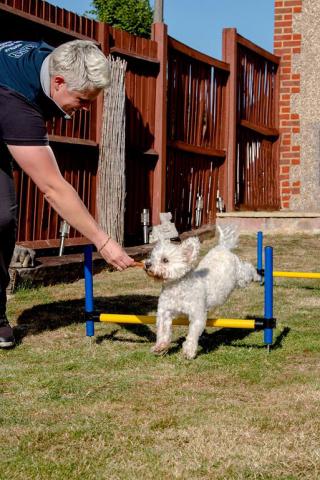For Vets
Body title
Why Use The RAMP Register?
Every musculoskeletal practitioner listed on this Register must uphold the gold standards as stipulated by RAMP.
These standards include:
- Exemplary professional skills and attributes
- Ethical business practice
- Excellent practice and clinical skills
- Evidence informed underpinning knowledge and understanding
- Practitioners on the Register work with permission from the animal's vet as required by The Veterinary Surgeons (Exemption) Order 2015. They will also work autonomously and in collaboration with the vet in cases of performance and maintenance of healthy animals.
What This Means For Vets
This Register offers vets, members of the public and other allied professionals the reassurance they need to safely refer to, and/or work closely with registered musculoskeletal practitioners.
- RAMP aims to endorse best practice methods of animal musculoskeletal therapy delivered by appropriately competent professionals
- RAMP registered practitioners follow a strict code of conduct, work within their scope of practice, comply with annual CPD requirements and have appropriate insurance
The Three Professions on the RAMP Register
The three professions of Chiropractic, Osteopathy and Physiotherapy have identified that they have more common ground than they have differences in working with animals. Within each profession, practitioners have a range of skills, techniques and areas of interest that they excel in, but all listed here have reached the Gold Standard required by RAMP.
Animal patients
Most registered practitioners are trained to treat a range of animals from mammals to birds, reptiles to farm animals. Some even treat zoo animals. As a result, we recommend that you contact your local practitioner and ask them directly for their area of expertise.
Musculoskeletal Care & Veterinary Treatment
The principle of musculoskeletal care is to mobilise and manipulate dysfunctional soft tissue and joints in order to restore, improve and optimise flexibility, symmetry, coordination, strength and balance. This will improve function and performance in terms of reducing pain, reducing asymmetries, restoring nerve function ultimately increasing mechanical strength and stability.
Any condition outside the Practitioner's remit is quickly referred back to the Veterinary Surgeon. Allowing early Veterinary diagnosis and treatment of pathology and collaboration on the ongoing care plan.
Musculoskeletal therapies are a non-invasive adjunct to veterinary treatment for musculoskeletal and post-surgical conditions.
Crisis Care
- Musculoskeletal conditions where non-invasive approach may be sufficient alone, and for any animal where surgery is not appropriate.
- Traumas as an adjunct to veterinary care to promote cell healing and restore optimal movement patterns.
- Neurological conditions where movement therapy may restore function and provide a cost effective solution.
Maintenance Care
- Identification and monitoring of compensatory movement patterns, which can identify early pathology prompting a referral back for Veterinary investigation.
- Long-terms conditions, the elderly or post-surgical.
- Regular check-ups are recommended to maintain fitness and improve prevention of avoidable injury.
Competition Care
- Where animals are involved in athletic activities, treatment can resolve minor musculoskeletal problems that challenge performance.
- Where the Multi Disciplinary Team has been proven to be an effective and successful management strategy improving animal welfare and owner satisfaction.
Latest News
RAMP Welcomes RCVS Announcement on Future Regulation of MSK Professionals
RAMP have steadfastly been working towards autonomous practitioner status in future legislative structure for fully regulated and qualified MSK practitioners.
Summary of MSK Practitioners Survey Results
RAMP conducted a survey of MSK practitioners to gain insight on how practitioners may like to be regulated in the future, what the structure of any Council should be and what title practitioners wo
